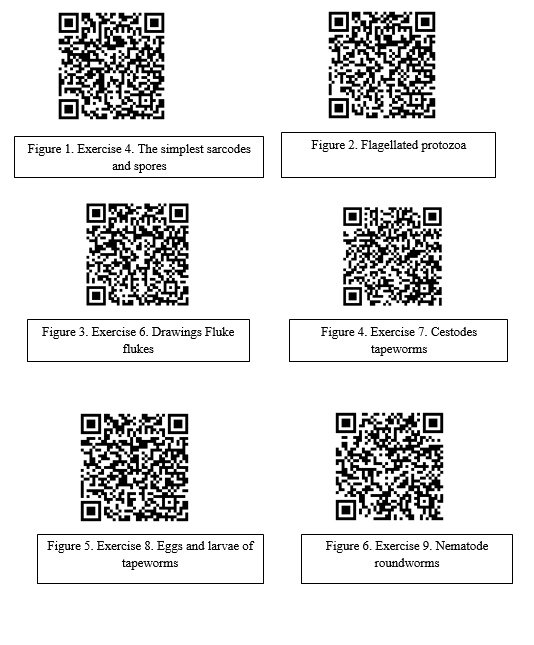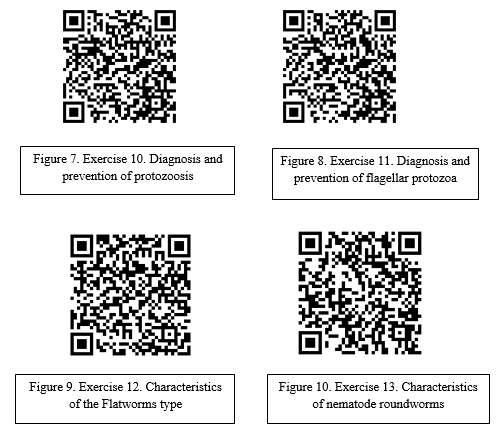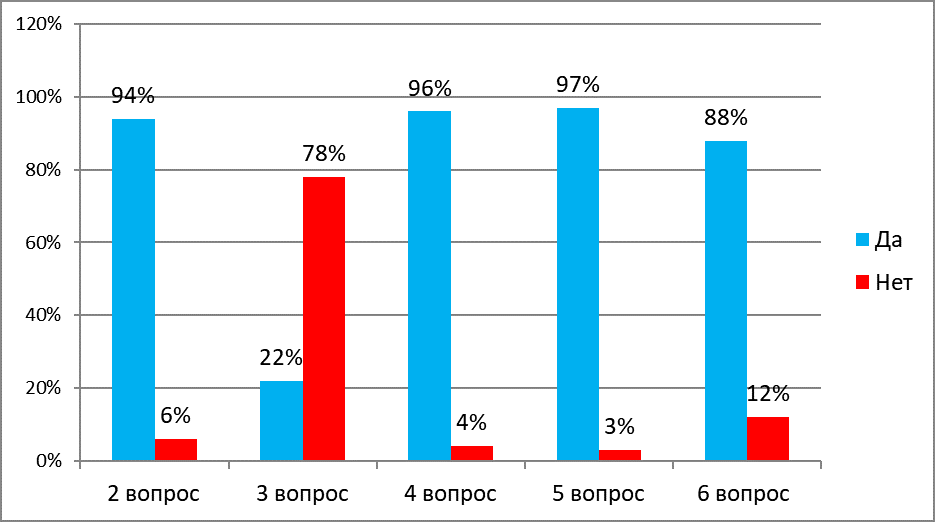Relevance: Modern information technologies affect the cognitive activity of students, help to achieve goals, help to consolidate knowledge in a playful way, develop communication skills, replenish and improve didactic material on the discipline.
Mentors in the compilation and development of game forms of tasks in the Learning Apps service were our teachers of the discipline «Fundamentals of Microbiology and Immunology» Gabysheva Lena Yuryevna, Shadrina Lyubov Ivanovna. We have set a goal – to master this service with the help of game tasks, to attract and interest students in the study of microbiology. We decided to focus on the interesting section «Parasitology», which includes protozoa and helminths. We have studied this section according to the textbook [1, p.11, 28, 46, 68, 77, 79, 82-98, 102-107, 116], as well as materials posted on the Moodle platform. Scanned drawings and photos of parasites for the preparation of tasks. We took the most common, socially significant and regional parasitic diseases. Parasites were divided into groups: protozoa of the class sarcodes and spores (Fig.1); class flagellates (Fig.2); helminths Fluke flukes (Fig.3); Cestodes tapeworms. (Fig.4); eggs and larvae of tapeworms (Fig.5); type nematode roundworms (Fig.6).

As well as the characteristics of parasitoses: diagnosis and prevention of protozoa (Fig. 7); diagnosis and prevention of flagellated protozoa (Fig.8); characteristics of the type of flatworms (Fig.9); characteristics of nematode roundworms (Fig.10). In total, 10 game tasks turned out. More complex tasks Fig. 7 to 10 number, which provided morphology, pathways of infection, localization, symptoms, diagnosis and prevention of parasitic diseases. For convenient execution of these tasks by students, QR codes were used for every 10 exercises. The convenience lies in the fact that you can perform these tasks from your phone at any time and at any time. The game tasks developed by us can be transferred to the Moodle platform. With the help of our teachers, the students answered all these exercises. Then we decided to conduct a survey based on the results of completed tasks.

A survey was conducted among students in the specialty «Medical care» and «Nursing» in order to identify the attitude of 1st-year students to game tasks in the service Learningapps in microbiology. A survey of 100 respondents was conducted. Questionnaire questions: 1- specialty, 2 – did you like the games?, 3 – Have you experienced difficulties in difficult tasks?, 4 — Do games help to master the discipline of microbiology?, 5 — Is it possible to use these games in classroom hours?, 6- Is it convenient to use the Learningapps Service? The questionnaire questions were compiled by us in the Googl form.

Diagram 1. Name your specialty
Specialty Nursing accounted for the majority of 67.3%, compared with Medical 32.7%.

Diagram 2. Identification of students’ attitude to game tasks in the Learningapps microbiology service
From the survey responses, it can be concluded that the majority of students have a positive attitude to the use of games in the classroom, 94%. 22% experienced difficulties in solving complex tasks. 96% believe that these game tasks help to build a section on parasitology. 97% want to use this service in thematic classroom hours. 88% of students believe that it is convenient and affordable to use the Learningapps service.
Conclusions:
The creation and application of interactive game tasks in the parasitology section created in the Learningapps service are convenient, easy to use, help develop creative and communicative skills, motivation for in-depth study and consolidation of educational material. It is possible to maximize the number of students, saving time and money, no fear of making a mistake. We have covered the topics on protozoa and helminths as much as possible. The created questionnaire questions in the Googl form make it easier to conduct and reach respondents. As a result, we found out that the majority of students have a positive attitude to the use of games in the classroom, and also help to build a section on parasitology. They expressed their opinion about the convenience and accessibility of using the Learningapps service and wish to use this service in thematic classroom hours. At the same time, a small number of students experienced difficulties in solving complex tasks, there were mistakes and they had to repeat the tasks.
References
1. Kornakova E.E. Medical parasitology: textbook. For students. Wednesday. Prof. of education/ E.E. Kornakova. – M.: Izadtelsky center "Akademi", 2017. – 224 p., [24] L. Tsv.il.2. Genis D. E. Medical parasitology. Training manuals. 2020. Lan Publishing House.
3. Moodle learning platform.The course "Fundamentals of microbiology and immunology".
